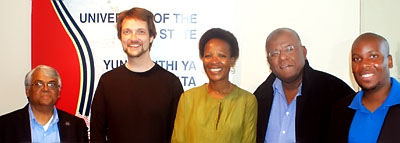Latest News Archive
Please select Category, Year, and then Month to display items
24 July 2024
|
Story Lacea Loader
![]()
The University of the Free State (UFS) is co-hosting the Global Social Innovation Indaba together with Social Innovation Exchange (SIX) on its Bloemfontein Campus from 30 September to 2 October 2024. This event brings together people from different sectors all over the world to discuss how to accelerate and support people-powered
change and create a better society for generations to come.
The UFS is excited to collaborate with SIX, as its vision and values overlap. During this three-day indaba, aspects such as – what it takes to build accountable, inclusive, and participatory institutions, specifically the future role of universities in South Africa – will be discussed. Themes to be explored include young people as drivers of change, post-industrial transitions and community resilience, the role of art, social change and bridging divides, and systemic approaches to dealing with unemployment.
Some of the speakers and participants in the programme include Carla Duprat from ICE (Brazil); Cheryl Jacob from ESquared Investments (South Africa); François Bonnici from the Schwab Foundation for Social Entrepreneurship (Switzerland); Sir Geoff Mulgan from the University College London (UCL) in the United Kingdom; and Dr Narissa Ramdhani from the Ifa Lethu Foundation (South Africa).
The UFS will also use the opportunity to showcase its campus and offerings to attendees, focusing on its transformation story and some of the interdisciplinary forward-thinking programmes. Guests will also be treated to true South African hospitality, laying the foundation for strong relationships and collaboration.
SIX believes in the transformative power of people working together. Exchanges based on mutual value and reciprocity are the missing link in tackling the world’s problems. As a friendly, expert entry point to global social innovation, their work connects organisations, sectors, communities, and nations to build capabilities and create opportunities for collaboration.
New York academic pays visit to UFS
2010-08-02
 |
Prof. Teboho Moja, a professor of Higher Education at NYU, paid a successful visit to the UFS. Here are, from left: Mr John Samuel, Interim Director: International Institute for Studies in Race, Reconciliation and Social Justice, UFS; Dr Bryan Urbsaitis, Assistant-Director of Study Abroad, Pace University, USA; Prof. Moja; Prof. Jonathan Jansen, Rector and Vice-Chancellor, UFS; and Dr Olihile Sebolai, Directorate Research Development, UFS.
Photo: Arthur Johnson
|
|
Prof. Teboho Moja, a professor of Higher Education from New York University (NYU), paid a fruitful visit to the University of the Free State (UFS). During her visit Prof. Moja, who is originally from South Africa, engaged with various stakeholders to further strengthen relations between the UFS and NYU.
Prof. Moja’s research focus is on the change in higher education and the implications of globalisation on higher education systems. As part of her visit to the UFS, Prof. Moja delivered a public lecture, entitled “Diversity oriented transformation for Teaching and Learning”. The lecture was presented by the Directorate Research Development and the International Institute for Studies in Race, Reconciliation and Social Justice.
Prof. Moja studied at the University of the Witwatersrand and obtained her Doctorate in Philosophy at the University of Wisconsin-Madison in the United States of America (USA).
In 1998 she became the first black woman to be appointed as chairperson of the council of the University of South Africa (UNISA). She is also an honorary professor at the University of Pretoria (UP).
On her visit to the UFS Prof. Moja was accompanied by Dr Bryan Urbsaitis from Pace University in New York and Ms Gina Canterucci from NYU. She also led a group of postgraduate students in International Education Studies. These students interacted with fellows from the Grow Our Own Timber Programme of the UFS. The interaction greatly contributed towards enhancing both student groups’ acuity on academic and social matters.
|